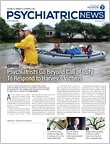More than 5 million Americans have Alzheimer’s disease, according to the Alzheimer’s Association. With no cure on the horizon, efforts are ongoing to find ways to improve the quality of life for Alzheimer’s patients.
Researchers are finding that music—whether listening to, singing along, or even playing an instrument—is one way to reach those affected by Alzheimer’s, even when they’re no longer able to communicate in other ways—while also providing a means by which some patients can still express themselves.
In a blog published by Alzheimers.net, Laura Mosqueda, M.D., director of geriatrics at the University of California, Irvine, School of Medicine, explained that because music affects so many parts of the brain, it touches areas that may not be damaged by the disease and brings those pathways to the forefront.
“Music plays a privileged role in human culture and communication,” wrote Nina Krauss, Ph.D., head of Northwestern University’s Auditory Neuroscience Laboratory, in a study published in August in the Neuroscientist. Krauss observed that most input to the brain is localized, but music sparks a response in multiple processing centers in the brain, including sound, memory, attention, language, sight, touch, and more.
A study in the April 2011 Neuropsychology by clinical neuropsychologist Brenda Hanna-Pladdy, Ph.D., and cognitive psychologist Alicia MacKay, Ph.D., found that older individuals who spent a significant amount of time throughout life playing a musical instrument perform better on some cognitive tests than individuals who did not play an instrument. The study was conducted when Hanna-Pladdy was an assistant professor in psychiatry at the University of Kansas Medical Center and a research faculty member of the Landon Center on Aging at the University of Kansas Medical Center.
“Musical activity throughout life may serve as a challenging cognitive exercise, making your brain fitter and more capable of accommodating the challenges of aging,” said lead researcher Hanna-Pladdy, a clinical neuropsychologist for the Deep Brain Stimulation Program at the University of Maryland Medical Center. “Since studying an instrument requires years of practice and learning, it may create alternate connections in the brain that could compensate for cognitive declines as we get older.”
The 2014 Sundance Film Festival award–winning documentary, “Alive Inside: A Story of Music and Memory,” explores the work of Dan Cohen, M.S.W., founder and executive director of the organization Music & Memory, which trains staff at health care facilities to set up personalized playlists for patients. The film shows the results of Cohen’s work with dementia patients who began talking and singing when listening to personalized playlists uploaded to an iPod. A video clip of “Henry” and his reaction when listening to his favorite recordings of Cab Calloway went viral and has brought worldwide attention to Cohen’s program. Since it was founded in 2010, Music & Memory has been instituted in more than 3,000 facilities across the United States, Canada, Australia, and Europe. ■
“Music Therapy for Dementia” can be accessed
here. “Neurobiology of Everyday Communication: What Have We Learned From Music” is available
here. “The Relation Between Instrumental Musical Activity and Cognitive Aging” is posted
here. Information about “Alive Inside: A Story of Music and Memory” can be viewed
here.
